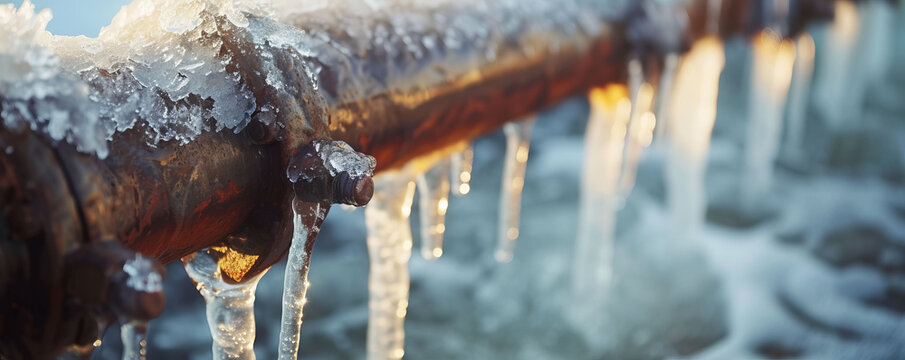Important Tips to Prevent Frozen Plumbing in Winter
Important Tips to Prevent Frozen Plumbing in Winter
Blog Article
The article down below about Prevent Frozen Pipes is rather interesting. You should give it a look.

Winter can ruin your plumbing, specifically by freezing pipes. Right here's just how to stop it from occurring and what to do if it does.
Intro
As temperatures decline, the threat of frozen pipelines boosts, possibly bring about pricey repair services and water damages. Recognizing exactly how to stop frozen pipes is crucial for house owners in cold climates.
Avoidance Tips
Shielding at risk pipes
Wrap pipelines in insulation sleeves or make use of heat tape to secure them from freezing temperatures. Focus on pipes in unheated or exterior areas of the home.
Heating strategies
Maintain interior areas appropriately heated, especially areas with pipes. Open up cabinet doors to allow warm air to distribute around pipes under sinks.
How to determine icy pipes
Try to find lowered water flow from faucets, uncommon smells or sounds from pipelines, and noticeable frost on subjected pipes.
Long-Term Solutions
Structural adjustments
Think about rerouting pipes away from outside walls or unheated areas. Add additional insulation to attic rooms, cellars, and crawl spaces.
Updating insulation
Purchase top quality insulation for pipes, attic rooms, and walls. Correct insulation assists preserve constant temperature levels and reduces the risk of frozen pipelines.
Shielding Outside Plumbing
Garden hose pipes and outdoor taps
Detach and drain pipes yard pipes prior to winter season. Mount frost-proof spigots or cover exterior taps with shielded caps.
Comprehending Frozen Pipes
What creates pipelines to ice up?
Pipelines freeze when exposed to temperature levels listed below 32 ° F (0 ° C) for extended durations. As water inside the pipes ices up, it increases, putting pressure on the pipe walls and potentially triggering them to break.
Dangers and problems
Frozen pipelines can cause supply of water disruptions, residential or commercial property damages, and costly repair work. Ruptured pipes can flood homes and trigger extensive architectural damage.
Indicators of Frozen Piping
Identifying frozen pipes early can avoid them from breaking.
What to Do If Your Pipes Freeze
Immediate activities to take
If you think frozen pipes, maintain taps available to ease stress as the ice thaws. Use a hairdryer or towels taken in warm water to thaw pipelines gradually.
Conclusion
Protecting against icy pipes requires positive measures and fast reactions. By comprehending the causes, indications, and safety nets, home owners can safeguard their pipes throughout winter.
Helpful Tips to Prevent Frozen Pipes this Winter
UNDERSTANDING THE BASICS: WHY PIPES FREEZE AND WHY IT’S A PROBLEM
Water freezing inside pipes is common during the winter months, but understanding why pipes freeze, and the potential problems it can cause is crucial in preventing such incidents. This section will delve into the basics of why pipes freeze and the associated problems that may arise.
THE SCIENCE BEHIND FROZEN PIPES
When water reaches freezing temperatures, it undergoes a physical transformation and solidifies into ice. This expansion of water as it freezes is the primary reason pipes can burst. As the water inside the pipe freezes, it expands, creating immense pressure on the walls. If the pressure becomes too great, the pipe can crack or rupture, leading to leaks and water damage.
FACTORS THAT CONTRIBUTE TO PIPE FREEZING
Low Temperatures: Extremely cold weather, especially below freezing, increases the risk of pipes freezing. Uninsulated or Poorly Insulated Pipes: Pipes located in unheated areas, such as basements, crawl spaces, or attics, are more prone to freezing. Insufficient insulation or lack of insulation altogether exacerbates the problem. Exterior Wall Exposure: Pipes running along exterior walls are susceptible to freezing as they encounter colder temperatures outside. Lack of Heating or Temperature Regulation: Inadequate heating or inconsistent temperature control in your home can contribute to frozen pipes. PROBLEMS CAUSED BY FROZEN PIPES
- Pipe Bursting: As mentioned earlier, the expansion of water as it freezes can cause pipes to burst, resulting in significant water damage.
- Water Damage: When pipes burst, it can lead to flooding and water damage to your property, including walls, ceilings, flooring, and personal belongings.
- Structural Damage: Prolonged exposure to water from burst pipes can compromise the structural integrity of your home, leading to costly repairs.
- Mold and Mildew Growth: Excess moisture from water damage can create a favorable environment for mold and mildew growth, posing health risks to occupants.
- Disrupted Water Supply: Frozen pipes can also result in a complete or partial loss of water supply until the issue is resolved.
WHY CERTAIN PIPES ARE MORE PRONE TO FREEZING
- Location: Pipes located in unheated or poorly insulated areas, such as basements, crawl spaces, attics, or exterior walls, are at higher risk of freezing.
- Exterior Pipes: Outdoor pipes, such as those used for irrigation or exposed plumbing, are particularly vulnerable to freezing as they are directly exposed to the elements.
- Supply Lines: Pipes that carry water from the main water supply into your home, including the main water line, are critical to protect as freezing in these lines can affect your entire plumbing system.
- Underground Pipes: Pipes buried underground, such as those connected to sprinkler systems or outdoor faucets, can be susceptible to freezing if not properly insulated.
https://busybusy.com/blog/helpful-tips-to-prevent-frozen-pipes-this-winter/

I hope you enjoyed reading our topic about Helpful Tips to Prevent Frozen Pipes this Winter. Thanks a lot for taking time to read through our article post. Do you know about anybody else who is excited by the subject? Why not share it. We thank you for your readership.
Call Today Report this page